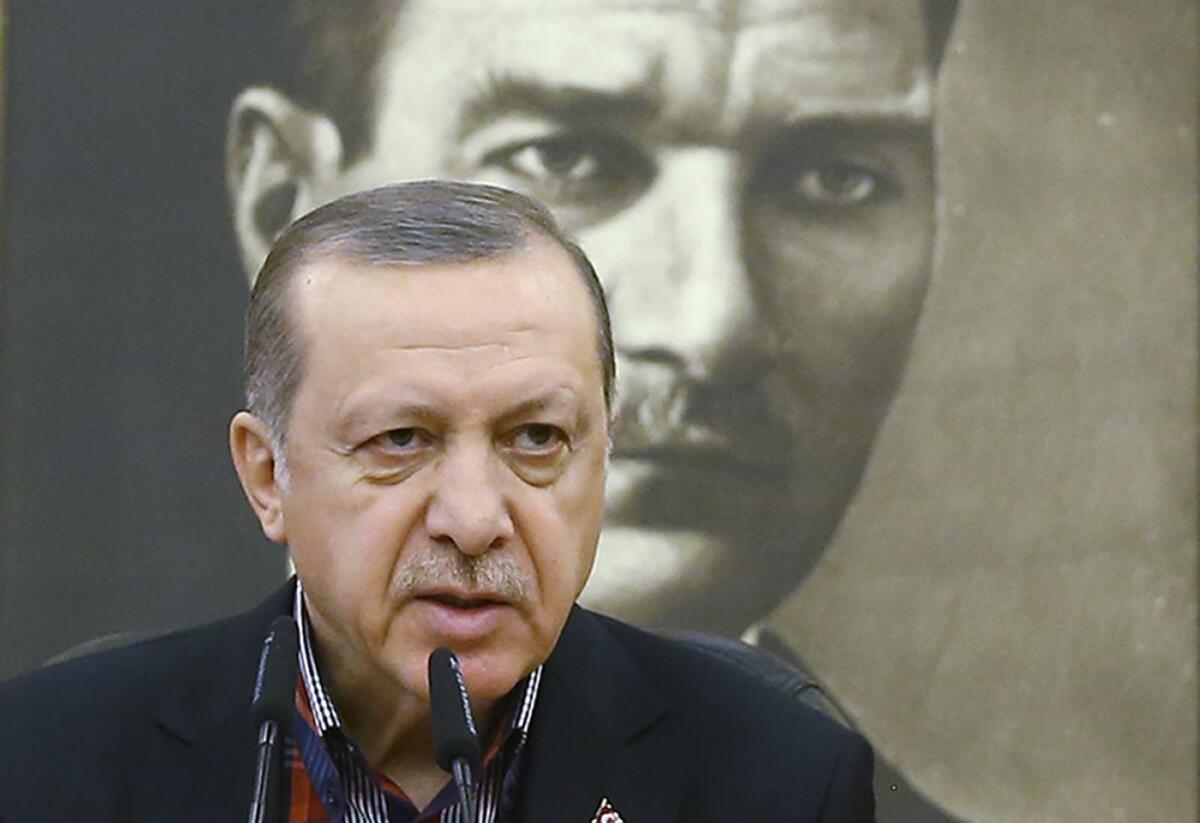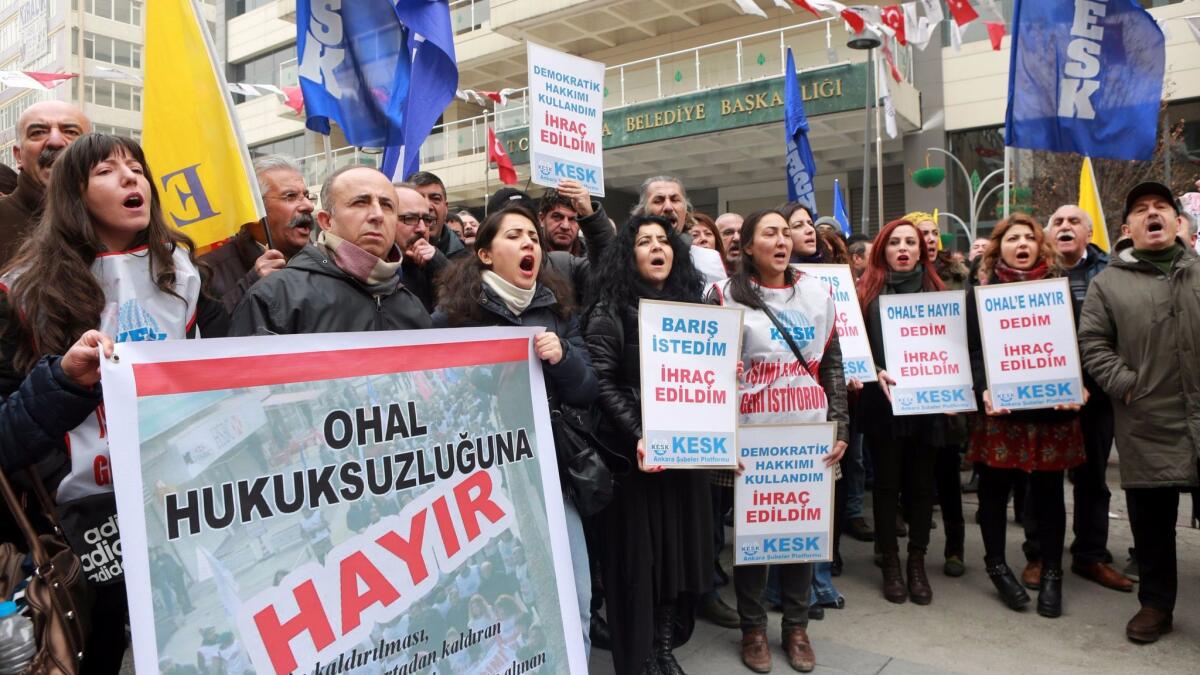As a constitutional referendum looms, some in Turkey say Erdogan is steering the country toward autocracy

- Share via
Reporting from Istanbul, Turkey — Turkish President Recep Tayyip Erdogan’s long-held dream of expanded powers and up to 10 more years in office will soon go before voters. But the proposed constitutional changes, which would usher in a presidential system, with a weak parliament, no prime minister and a subservient judiciary, have divided the country and embittered his critics.
Parliament, which Erdogan’s Justice and Development Party dominates, endorsed the package Jan. 19, in effect voting to strip itself of power, and election authorities set April 16 as the date for a nationwide referendum.
There hasn’t been much public discussion, and when it begins, Erdogan has seen to it that the airwaves are likely to carry the government case. But that’s only one element of the problem for free discussion.
Turks are still recovering from a failed coup in July and are living under a state of emergency. They are in a state of shock from terrorist attacks and worried by the continuing Kurdish insurgency in the southeast.
The news media have been subjected to unprecedented intimidation, with Erdogan ruling by decree and closing down print outlets and broadcast units as he sees fit. Print and broadcast media are now almost entirely in the government camp, and 151 journalists and other news media workers are in jail.

Demonstrators shout slogans and hold banners during a protest in Ankara, Turkey, against the dismissal of academics from universities.
Foreign human rights monitors have issued scathing reviews of the proposals for constitutional change, under which Erdogan, already in power for 14 years, will be head of his party, government and state — and be eligible to run for two more five-year terms. If passed, the changes would take effect in 2019.
The amendments will “pose a huge threat to human rights, the rule of law and the country’s democratic future,” for they will “concentrate unchecked power in the president’s hands,” New York-based Human Rights Watch said last month.
The current political environment is “completely inappropriate for a vote of any kind,” said Nate Schenkkan, a Turkey expert in the Washington-based Freedom House, who added that the April 16 decision will shape Turkey for decades to come.
The Council of Europe, the continent’s leading human rights body, voiced “deep concerns” about whether the revised constitution would guarantee the separation of powers, proper checks and balances, and the independence of the judiciary, “which are a prerequisite for democratic societies.”
In a report issued Wednesday, the European commissioner for human rights expressed “grave concerns” that the amendments would reduce the autonomy of an already weak judiciary and fail to address the current constitution’s “serious shortcomings” in human rights and freedom of expression.
What is the point? He’s already undisputedly running the country.
— Nate Schenkkan, Turkey expert at Freedom House
And the European Union’s most powerful politician, German Chancellor Angela Merkel, while in Ankara, the Turkish capital, this month, called the changes a “profound political transformation” and urged that “everything should be done to ensure that separation of powers and plurality of opinion are guaranteed.”
Pro-government media have predicted an easy victory for Erdogan, with one daily newspaper, Sabah, calling it a “shoo-in.”
Polls, however, show the public is almost evenly divided. Erdogan acknowledged as much Sunday as he left on a tour of Persian Gulf states.
“At this moment, I don’t think our people have come to the point where they can understand the presidential system clearly,” he said.
The uncertain prospects seem to have rattled him and his top aides, who demonize opponents as following the lead of terrorist movements.
There’s little dispute that Turkey needs a new constitution to replace the 1982 document imposed on the population by a military government and since ratified 18 times. But unlike the last major attempt to draft a constitution 10 years ago, which added whole sections to protect civil and human rights, the latest amendments focus almost exclusively on Erdogan’s desire for a presidential system.
Freedom House’s Schenkkan expressed surprise that Erdogan was putting so much effort into the changes when he already has the power. “What is the point? He’s already undisputedly running the country,” Schenkkan said.
The 18 amendments to be voted on came about not by holding a convention or assembling a panel of experts, but in an undisclosed backroom deal between Erdogan’s party, which has 317 deputies in the 550-seat parliament, and the rival Nationalist Movement Party.
Until the failed July coup, the Nationalist Movement Party was a bitter critic of suspected corruption in Erdogan’s party.
The second-biggest party, the Republican People’s Party, with 133 seats, was created by the founder of modern Turkey, Kemal Ataturk, and is dead set against the changes, as is the other major party, the pro-Kurdish People’s Democratic Party.
As many as 12 members of the Kurdish party, including its two leaders, are in jail on suspicion of supporting the outlawed Kurdistan Workers Party or PKK, which is at war with the Turkish state.
One tactic used by the government’s campaign has been to use the country’s crisis to paint potential “no” voters as PKK sympathizers. Prime Minister Binali Yildirim charged last week that the the PKK and followers of self-exiled cleric Fethullah Gulen, whom Erdogan blames for the coup attempt, “are terrorists and of course we say ‘yes’ to what they say ‘no.’”
Erdogan, far from maintaining neutrality as is he is obliged to under the current constitution, said Sunday that the referendum was a response to the coup attempt. “The position of those who will say ‘no’ in the referendum could mean siding with July 15,” he said, referring to the date of the coup attempt.
Erdogan was “just making an observation,” said Ahmet Berat Conkar, a member of parliament from Istanbul, representing Erdogan’s party. He said neither Erdogan nor Yildirim think that “no” voters are members of terrorist groups.
“What they are saying is that these groups are very strangely lining up in the same camp. So think about your vote,” he said.
Then last week, Erdogan used his emergency powers to suspend Turkey’s equivalent of the “fairness doctrine,” so there will be no penalties if television stations fail to give equal time to speeches for and against the referendum. With nearly all TV networks in the pro-government camp, this could stifle public debate.
“With this new regulation, only they will call the shots until the referendum, and the TV stations will be able to freely broadcast only for the advantage of one side,” tweeted Kemal Kilicdaroglu, leader of the Republican People’s Party, after the decision was published.
Conkar responded that there are “dozens of media outlets. Everyone is trying to push his own position. In this complex environment of Internet, social media, everyone is able to make his statement heard, for or against the changes.”
And how many “no” campaigners will take to the streets to demonstrate their position after the arrests of young people just for carrying placards? “The elected president of the country openly calls for a ‘yes’ vote and accuses those who call for ‘no’ of being terrorists. Can things get any more biased?” said Yasemin Bektas, a civil society activist in Istanbul.
Ergun Ozbudun, a law professor at Ankara’s Bilkent University, headed the panel of experts that worked on the 2007 draft for a new constitution at Erdogan’s request. “It was a much more democratic and liberal text,” he said, “100% different from what is proposed today.”
He said he opposes the proposed changes because they will lead “essentially to one-man rule, without parliamentary control, without effective judiciary control, without effective media control. It will amount to one man’s personal control.”
Even if the amendments pass, it’s not the end of the road for shifting the balance of power among the branches of government, said Levent Korkut, a law professor who works with Checks and Balances, a nongovernmental organization that has done studies on the separation of powers.
He said that parliament under the amended constitution “is not strong enough,” but that modifications could be made by giving subcommittees the authority to oversee presidential appointments and making it easier for parliament to launch investigations. But the opposition refused to enter the discussion.
“That’s the problem,” he said. “There is no creativity on the opposition side. They just defend the old system. But the old system was not a good system.”
Gutman is a special correspondent.
ALSO
Here’s why the idea of moving the U.S. Embassy in Israel remains controversial
A human rights activist is slain in Cambodia, and the mystery leads all the way to California
Romania is engulfed by protest in a political awakening of the young
More to Read
Sign up for Essential California
The most important California stories and recommendations in your inbox every morning.
You may occasionally receive promotional content from the Los Angeles Times.










